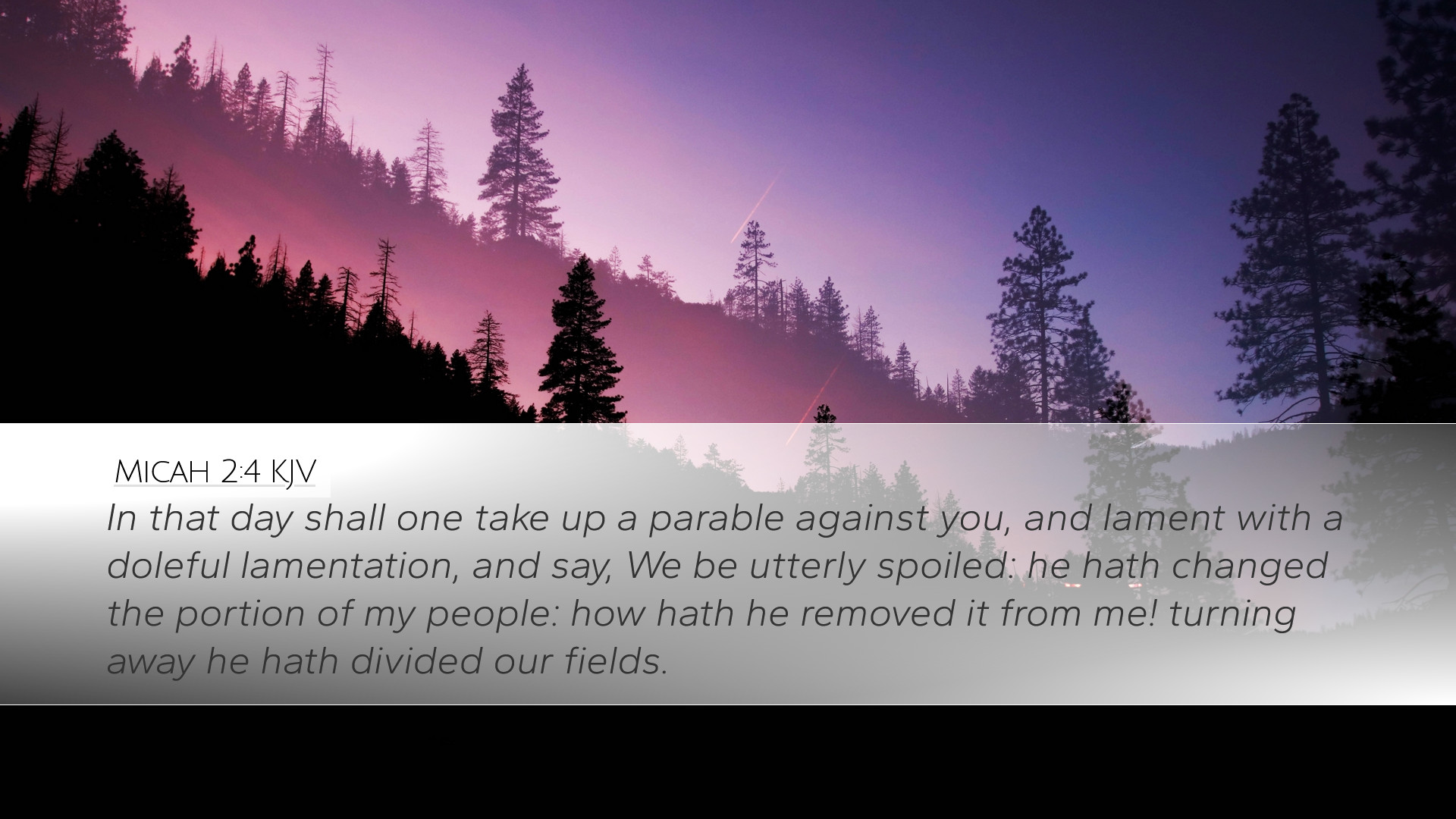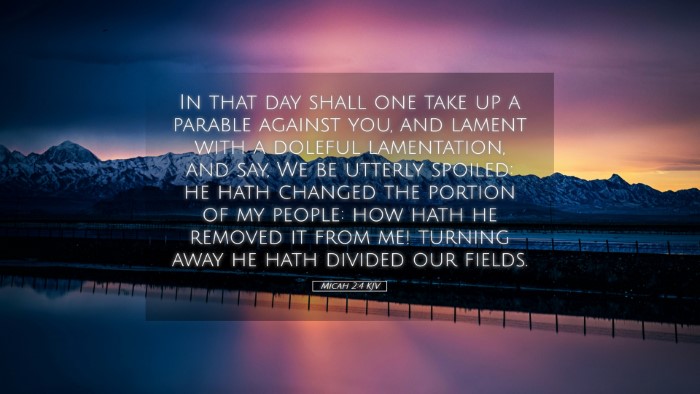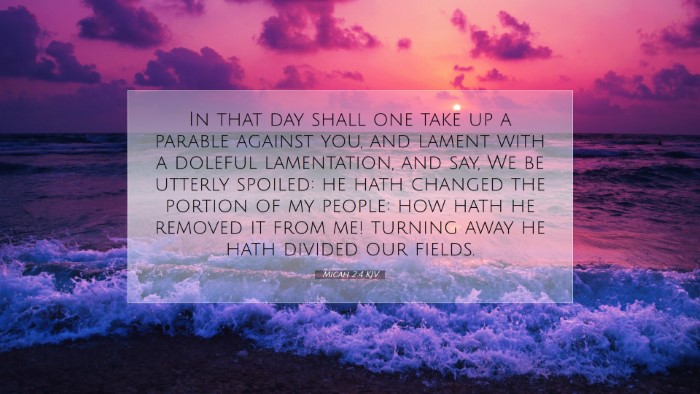Old Testament
Genesis Exodus Leviticus Numbers Deuteronomy Joshua Judges Ruth 1 Samuel 2 Samuel 1 Kings 2 Kings 1 Chronicles 2 Chronicles Ezra Nehemiah Esther Job Psalms Proverbs Ecclesiastes Song of Solomon Isaiah Jeremiah Lamentations Ezekiel Daniel Hosea Joel Amos Obadiah Jonah Micah Nahum Habakkuk Zephaniah Haggai Zechariah MalachiMicah 2:4
Micah 2:4 KJV
In that day shall one take up a parable against you, and lament with a doleful lamentation, and say, We be utterly spoiled: he hath changed the portion of my people: how hath he removed it from me! turning away he hath divided our fields.
Micah 2:4 Bible Commentary
Commentary on Micah 2:4
Verse: "In that day shall one take up a parable against you, and lament with a doleful lamentation, and say, We be utterly spoiled: he hath changed the portion of my people: how hath he removed it from me! Turning away, he hath divided our fields."
Introduction
The verse chosen for commentary, Micah 2:4, reflects a profound social and theological commentary on injustice, exploitation, and the resulting lament of the people of Israel. This passage highlights the consequences of sin and unfaithfulness to God, particularly in the context of those who are oppressed and defrauded by their leaders. The prophets, such as Micah, serve as vocal instruments of God's judgment against Israel's moral failings and injustices.
Context of Micah's Prophecy
Micah, a contemporary of Isaiah, prophesied during a time of great political and moral turmoil in Israel. The people faced oppression from various quarters, including their own leaders who exploited the weak and disregarded justice. This chapter specifically addresses the outcomes of such societal corruption, interrogating how the divine judgment manifests in various forms.
Commentary Insights from Public Domain Sources
-
Matthew Henry's Commentary:
Henry articulates that this verse serves as a foreboding reflection of the destruction and lamentation that will follow Israel's perverse actions. He emphasizes that the parable mentioned indicates a transformation in status—a decline from prosperity to ruin, suggesting that those who once enjoyed favor will be lamenting their decline. He points out that the people are portrayed as victims lamenting their lost inheritance and that this lamentation signifies a collective grievance against God’s judgment.
-
Albert Barnes' Notes:
Barnes highlights that the "parable" refers to a proverbial saying that captures the essence of Israel's plight. He reflects on the 'doleful lamentation' conveying sorrow for the desolation brought upon them. His interpretation asserts that the actions of the oppressors not only defraud the people of land and heritage but also lead them to question their standing with God. This deep introspection reveals their spiritual desolation as well as the physical loss of their land.
-
Adam Clarke's Commentary:
Clarke comments on the symbolic nature of 'the fields' as representation not just of physical territory but of one’s identity and heritage. He notes, "He hath changed the portion of my people," indicating a divine reaction to the systemic injustice perpetrated by the leaders against the innocent. Clarke's analysis underlines the severity of divine response to human malfeasance, suggesting that the implications of these injustices reach far beyond material loss and impact the spiritual state of the nation.
Thematic Analysis
Several key themes emerge from Micah 2:4:
-
Divine Justice:
The verse underscores the concept of divine retribution. The lament points to a recognition that the injustices committed have not gone unnoticed by God, who will respond with judgment. This serves as a reminder to leaders and individuals alike about the weight of their moral responsibilities.
-
Loss and Lamentation:
The lamentation depicted here reflects a collective mourning over lost communal and personal integrity. This can also be seen as a call to repentance and the acknowledgment of sin before restoration can occur.
-
Hope amidst Judgment:
While the immediate context draws attention to sorrow and loss, it also foreshadows the hope for future restoration. This duality is vital in understanding the prophetic messages: they confront sin but also offer hope for redemption, illustrating God’s unyielding commitment to His people.
Applications for Today
For pastors, theologians, and students, Micah 2:4 is a rich text for reflection and application. Its profound implications touch upon various aspects of contemporary society:
-
Social Justice:
The call for justice inherent in the lament reminds modern readers of their responsibility to champion the cause of the oppressed in their communities. Leaders are urged to uphold integrity and fairness, reflecting God’s character in their dealings.
-
Spiritual Reflection:
The importance of self-examination and communal accountability is highlighted in this verse. It serves as a poignant reminder for believers to assess their own roles in upholding justice and righteousness within the framework of their faith communities.
-
Hope in Redemption:
Ultimately, the passage encourages believers to look toward God’s promises of restoration, maintaining hope even in the midst of societal breakdown and personal despair. This hope, rooted in faith, can empower believers to speak truth to power and advocate for change.
Conclusion
Micah 2:4 serves as a powerful reflection on the spiritual and social ramifications of injustice, encapsulating both the sorrow associated with loss and the enduring hope for divine intervention. Through the insights derived from classic commentaries and thematic exploration, it becomes evident that this ancient text speaks poignantly to the present socio-spiritual atmosphere, urging a proactive stance toward justice and righteousness.


